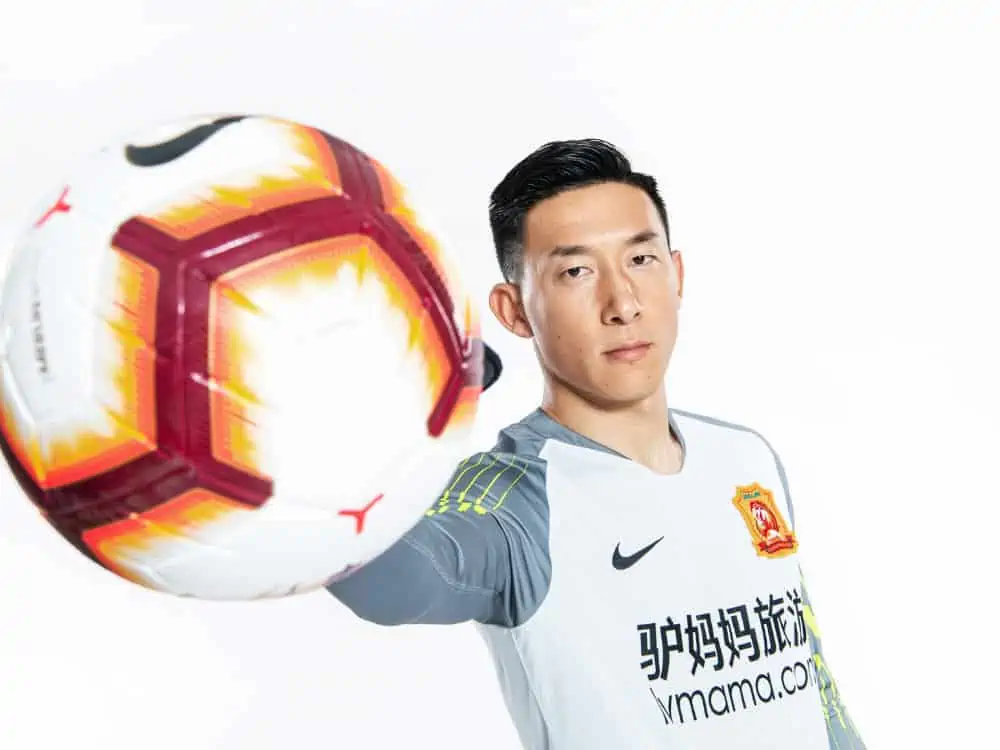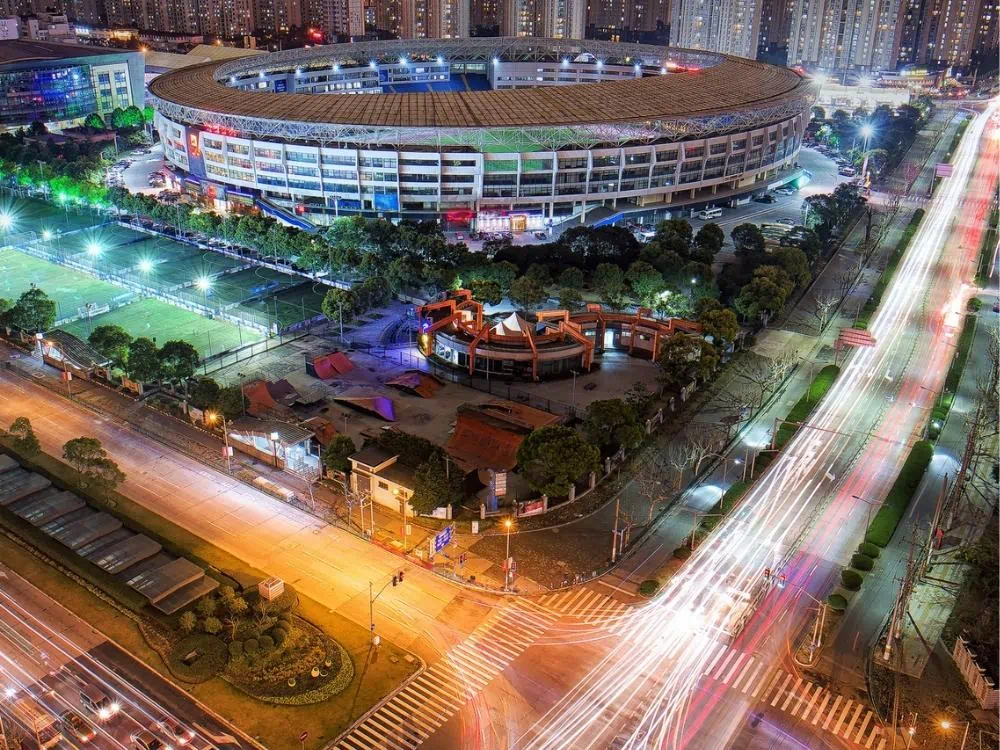Share the post "Why Is China Bad At Soccer? (World Cup/Culture/History)"
As the most populous country in the world, where soccer is the most popular spectator sport, one might assume that China is a global soccer powerhouse.
However, this is not quite the case as their men’s and women’s teams struggle to make an impact on the global scene.
Since Chinese athletes don’t seem to blunder on the world stage in the Olympic games, it begs the question, why is China bad at soccer?
This article answers that very question, taking a look at the corruption, lack of infrastructure, and other issues that prevent China from becoming an elite soccer team. Some of the important topics we cover include:
- China’s deep soccer origins
- Reasons for China’s struggles in soccer
- The emergence of the Chinese Super League
- Chinese national teams
If the right investments are made, can you see a future where China becomes a hotbed for soccer talent?

A Brief History Of Soccer In China
In 2004, Sepp Blatter, who was the president of FIFA at the time, made the claim that the earliest version of soccer could be traced back to the Han Dynasty, China, in 221 BC.
It’s believed that individuals or teams competed to kick a feather-filled ball into each other’s nets. Exerts from old military diaries stated that this game was extremely popular among Chinese imperials and it experienced extensive development for hundreds of years.
Despite these early links, China has never been the epicenter of the sport. Soccer, as we know it today, went through major development in Great Britain in the 1800s, when the official Cambridge rules were first established. The sport was spread mainly by British and European sailors, workers, and merchants traveling along major trade routes.
Much like the rest of the world, China adopted the British version of the sport quickly around the turn of the 20th century. It was consistently one of the strongest Asian national teams in the early 1900s. Famed striker, Li Huitang was commonly known as the soccer king of Asia.
China in Soccer Finals
However, when it comes to major international tournaments, China has never made a real impact. Since the first AFC Asian Cup in 1956, China has reached the final twice but came up short on both occasions.
In its only ever appearance in the FIFA World Cup (2002), China lost all games, without scoring a single goal.
The Chinese national team experienced most of its successes in the East Asian Football Championship. China won the entire tournament on two occasions, in 2005 and 200, making them the second most successful team in the competition’s history.
China failed to qualify for the 2022 World Cup, extending their World Cup drought to 20 years.

Why Is China Bad At Soccer?
With such strong ties to the origins of soccer, China’s failure to succeed in the game is a mystery to many. However, if you look a little closer, the reasons start to become obvious.
The first setback dates back to the middle of the 17th century during the Manchu occupation of China.
This occupation severely hampered the development of the Chinese civilization, setting them back thousands of years. Education, martial arts, and sports were prohibited nationwide, including soccer.
Although China recovered over the succeeding centuries, the sport of soccer was essentially lost.
Failures With The Domestic Development
While China has failed to make an impact on the national stage, the country has invested significantly in its domestic league.
Throughout the 1970s and 80s, China invested in sports science programs designed to progress youth soccer and progress the development of the next generation.
Elite coaches were assigned to primary school academies, creating a structured path from youth to professional level.
During this time, China’s professional soccer league was prospering. There were several competitive teams and interest levels rose significantly. Soccer was seen as a viable path to a successful life and career. The youth-oriented approach was also generating talented youngsters.
Despite early signs of success, the program ultimately failed. Students and their families struggled to find a balance between soccer and school duties. The school league system was also rife with corruption. Teams routinely forged age and school registration information to play older students.
In the early 1990s, the program ended as there were not enough kids participating regularly. A new effort was made in 1994 but inevitably, the initiative faced the same problems as previous attempts.
Focus On Other Sports
In their efforts to grow the sport, Chinese soccer bodies put a major focus on sports science and analytics. While other sports are highly adaptable to the “Moneyball” approach, soccer is often resistant to scientific analysis.
Although we’re seeing analytical models, like xG, become more relevant today, this wasn’t the case in the 90s.
While basketball players are typically a certain size and build in relation to their position, the same can’t be said for soccer athletes. How do you explain Diego Maradonna’s success in comparison to Cristiano Ronaldo with such contrasting physiques?
Sporting authorities found more success investing in predictable games like badminton or table tennis. This caused them to allocate more funding to other areas.
Chinese Super League (CSL)
Perhaps the most notable and expensive effort to take Chinese soccer to another level was the Super League. Although the league was started in 2004, it didn’t rise to prominence for approximately a decade.
Over the years, it has expanded from a 12-team competition to a 22-team league. Throughout this period, the league grew in popularity, garnering support that rivaled other major global soccer leagues.
Guangzhou Evergrande established itself as one of the most popular and competitive teams. It was the first side to win back-to-back league titles in 2012.
They went on to become the first team from the CSL to win the Asian Champions League. That same year, David Beckham was announced as the first-ever global ambassador of the CSL.
Chinese president, Xi Jinping made bold claims in 2015, revealing his ambition for China to become a leading country in soccer:
“My biggest hope for Chinese soccer is that its teams become among the world’s best”
Xi Jinping, 2015
This partnership shone a spotlight on the CSL. Guangzhou Evergrande quickly become a well-known team worldwide as they managed an astonishing seven titles in a row.
The CSL started to attract soccer superstars, with European and South American players joining Chinese teams for extraordinary wages.
Some top players signed for CSL teams include:
- Paulinho
- Ramires
- Jackson Martinez
- Fredy Guarin
- Carlos Tevez
- Ricardo Carvalho
- Oscar
- Alexandre Pato
The CSL has been one of the most popular professional sports competitions in China for many years. In 2018, it was the 12th highest attended sports league in the world, with over 24,000 fans attending league matches on average.
It was the 6th highest attended soccer league, falling just behind the Premier League, La Liga, Bundesliga, Serie A, and Liga MX.
While the standard of soccer in the CSL has never been higher and the star power has never been stronger, China still underperforms as a country. Since the vast majority of funding goes to foreign player transfers and wages, there still doesn’t seem to be a gap for Chinese stars to emerge from.
What Sports Are Popular In China?
Sports are an important part of Chinese culture. While the primary focus of the youth is on academics, Chinese kids and adults participate in a range of sports. Some of the most popular sports in China include:
| Popularity Rank | Sport |
| 1 | Soccer |
| 2 | Basketball |
| 3 | Volleyball |
| 4 | Table Tennis |
| 5 | Badminton |
| 6 | Martial Arts (Various) |
| 7 | Running |
| 8 | Skiing |
| 9 | eSports |
| 10 | Snooker |
Do you have hope for Chinese soccer? Could we eventually see them emerge as a major player on the global scene?
Share the post "Why Is China Bad At Soccer? (World Cup/Culture/History)"
Joel is a seasoned soccer journalist and analyst with many years of experience in the field. Joel specializes in game analysis, player profiles, transfer news, and has a keen eye for the tactical nuances of the game. He played at various levels in the game and coached teams - he is happy to share his insight with you.



